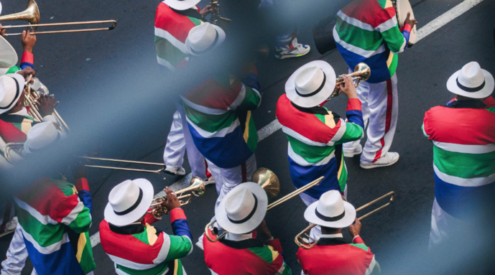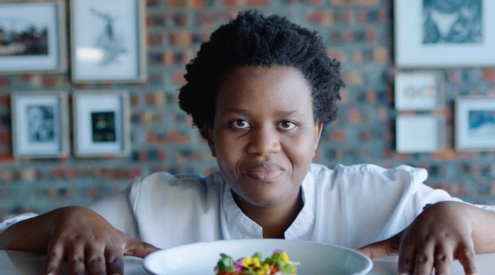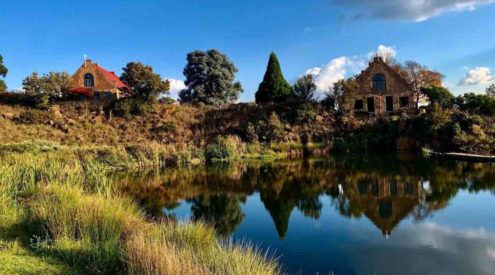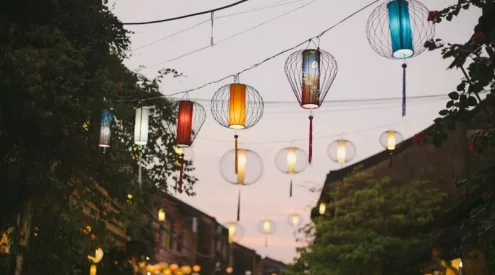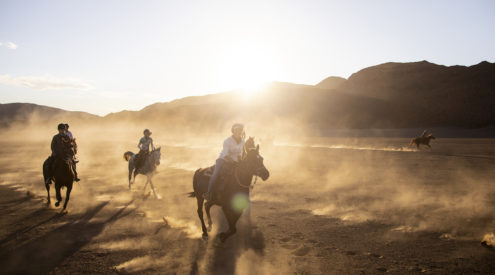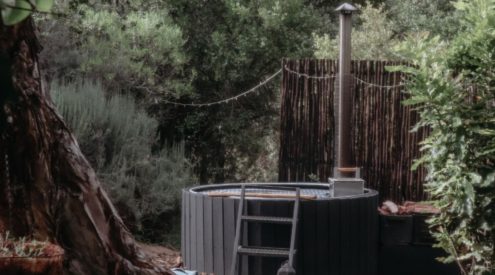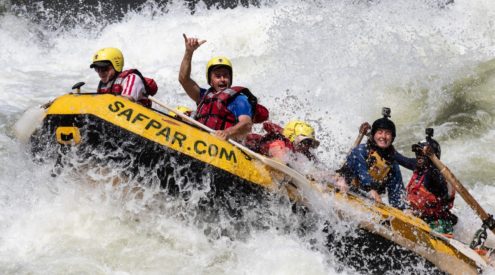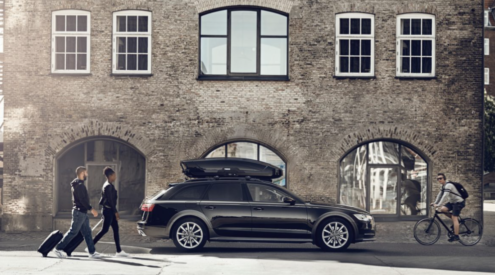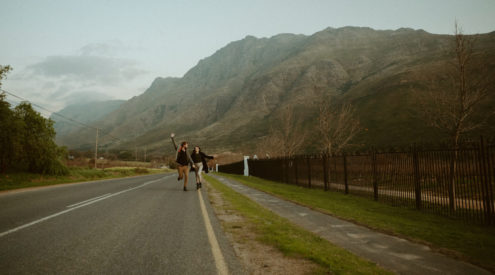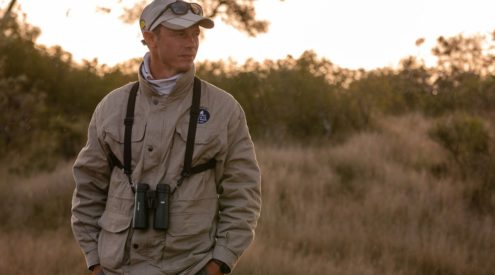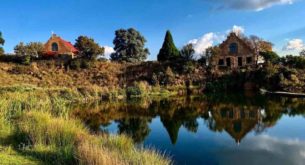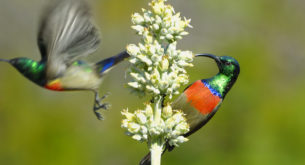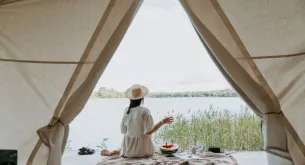Thami Manyathi came to Durban as head of the eThekwini transport authority with the goal of implementing Go! Durban. Before this, he never ‘got’ iTheku. But now, three years later, he’s been totally won over. I managed to get his insider view.

Thami Manyathi, in his recommended Hotel of the Month – Makaranga Garden Lodge. Photo by Teagan Cunniffe.
You have a colleague visiting from San Francisco. Where should they stay?
Makaranga Garden Lodge. It’s one of a kind. If you want to find some peace ‒ a place where you can relax, kick back and reflect, this would be the place for you. It’s beautifully located, has nice trees and a beautiful garden… It’s not what your usual tourist place would look like: it’s got an air of exclusivity about it, the food is great and for business people, it’s got conference facilities as well. It’s a nice package.
What should their first stop be in Durban?
The heart, of course, is in the CBD and that’s where I would start. Not so much the beachfront area as everybody goes there, but if you go into the inner CBD, your Warwick Junction, where [there are] traditional markets, spice markets and where you’ll find mother-in-law chilli powder ‒ the hottest you’ll ever hope to find ‒ that is where the history of the city originates… I wish we had a lot more architecturally striking facilities, but the few we do have here in the city you’ll find there.
What does Durban have that Cape Town doesn’t?
I think a big thing: it’s got a gentleness about it. The lushness is part of what gives it that gentle energy. The mix of different cultures here is quite unique. In Cape Town, if people aren’t tuned just so, you feel like you don’t belong there. I went to school there. I was at UCT and a lot of friends of mine worked there for many years and a lot of them, after we graduated, couldn’t wait to get out because they didn’t feel like they belonged. The natural beauty there is hard to beat. Go beyond your [Durban’s] beachfront and discover its few gems, Durban kicks ass. For me it was a surprise. I’ve lived here, but it was never the place. Now I get it. The gentleness is the distinction.
Also see: Photoblog – dropping into Durban
Why do we need Go! Durban?
It’s about improving the quality of life for people. Public transport is a huge issue for the majority of our citizens. I would venture that 80 percent of our communities can’t afford their own vehicles and rely on public transport to get to various points of interest, be it work, recreation, shopping and so forth. Historically as a country, we’ve never invested in public transport and it is, for me, a truly proud moment that in this day and age we are investing in ensuring that the people who use public transport can travel with dignity… It’s going to change the face of the city in terms of the quality of life of the citizens.
So you ride a bike to work, why?
It’s the joy and freedom one gets when you’re riding. Life is generally cluttered, people demanding your attention. But when you ride, there’s the physical exertion part, which requires that you focus. In our cities, unfortunately, it’s still not as safe as I would like it to be for everyone to ride, and we’re working on that… It also provides me with moments of clarity. When you’re working on a problem and you’re riding, some of the answers come.
What has informed your passionate vision for transport in the city?
It is in understanding the human side of it. Public transport is in my blood. My uncle in the rural areas used to run a little bus service called Qeda Umona Bus Services, my father used to work here in Durban as a bus driver, and so I’ve grown up with public transport. You understand the importance of public transport in people’s lives.
As you get more advanced in your academic training and development, you start understanding how critical it is for cities to develop – getting your public transport system right is absolutely critical. And then you see demonstrations in other cities – Singapore and Brazil are two inspirations. Curitiba in Brazil has stunning, visionary work they got going years ago… And then there are other layers which address the softer issues: community, the values people share as citizens, how you honour the elderly for the contribution they have made, and look after the young because they are the future of the city. It’s a whole lot of small things founded on the strong belief that we need to have a city that works.
What elements make for a good holiday?
Smooth transport. If you’re hassle-free, it doesn’t intrude on your holiday. That is a key ingredient. The second one is food – great food. Thirdly, I’d say the people in the different countries. The holidays that have made an impression on me – yes, the city space and so on, is great – but if you’ve made connections with people in that space, that makes it memorable.
Where was your last trip away?
In Mozambique, at Massinga Beach in Inhambane Province. Fabulous. The people there, ah, such warmth! Unspoilt, right on the coast, beach walks. The communities actually fish for the resort. They go diving for crayfish and prawns and bring that back, and in the evening you get to eat it. It was a fabulous time.
What did it for you?
Firstly, it’s the people. They are very warm and welcoming, but not intrusive. They are there. Wherever you turn there is someone looking after you. That was the one thing. This resort has tried to do some work to … integrate its activities with the local communities and so a lot of the produce – the food, the herbs, the veggies – they require for the resort they source from the local market. The local fishermen fish for the resort; they employ local staff. They have done some [things] to make sure there is sustainable development, utilisation of the local material and everything seems integrated. We were a bit disturbed to hear they’re going to be putting electricity into the resort. There is a generator that is on for only a few hours a day, and after 10pm, it goes off. You read, you sleep and you recover, and with waves and so forth, it’s magic. There are no distractions.
Where to next on the continent?
Tanzania. I want to climb Mount Kilimanjaro one of these days, and, Ethiopia. From what I gather, it is a different world altogether. They have their own clock system. It’s an ancient people that are there.
Internationally?
I want to have a cycling holiday in either Italy or Austria. Just to cycle. That would be cool.
Thami Manyathi also shared his favourite secret hideaway with us:
Check out the rest of our interview archives here.
This article first appeared in the December 2014 issue of Getaway Magazine.

